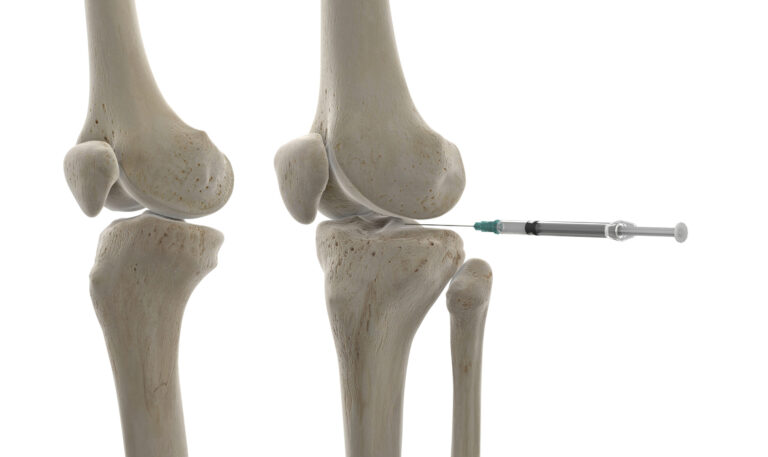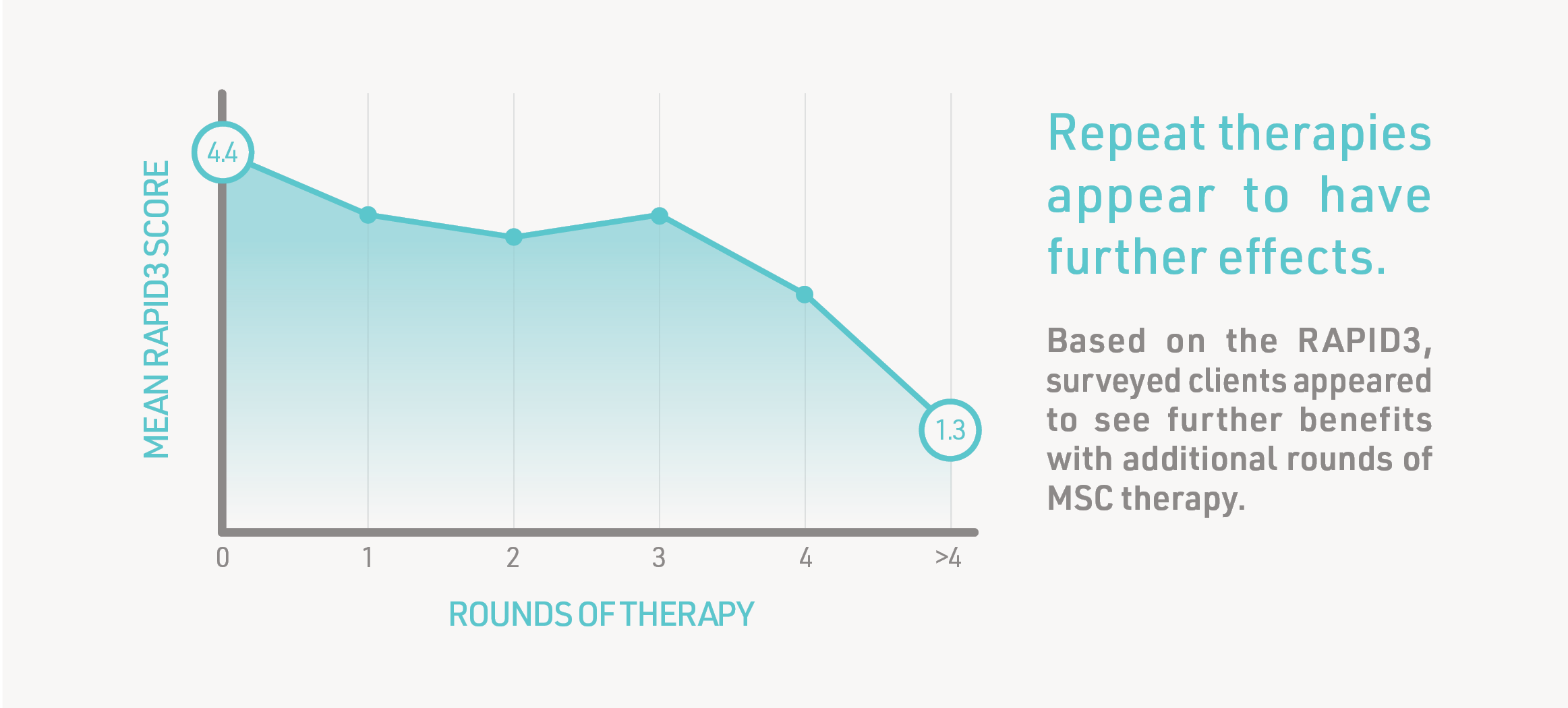Celltex News
The Benefits of Repeat Doses in Stem Cell Therapy

A question we’re often asked is “If I receive stem cell therapy, how many times will I need to come back to get more therapy?”
While the answer isn’t necessarily cut and dried, recent research, both from external studies and from Celltex’s client-reported results, may be able to help us begin to answer that question.
What Is Mesenchymal Stem Cell (MSC) Therapy?
Before we go any further, it’s important to understand what Mesenchymal Stem Cells (MSCs) are and why they are being researched for such a wide array of therapeutic applications.
MSCs are, of course, the type of stem cell we focus on here at Celltex. Like most types of stem cells, they have demonstrated the ability to differentiate into other types of cells, giving them regenerative properties that may help promote tissue repair.
However, MSCs’ main claim to fame is the unique immunomodulating properties that make them “one of the most powerful anti-inflammatories there is,” as explained by Celltex Chief Medical Officer Dr. Stanley C. Jones in a recent webinar.
The process by which MSCs use their immunomodulating properties to modulate inflammation is complex, but it involves the MSCs’ ability to inhibit the appearance and activation of specific immune cells responsible for inflammation — making MSC therapy a promising area of research for conditions like osteoarthritis, rheumatoid arthritis, multiple sclerosis, and other autoimmune or inflammatory conditions.
What Research Tells Us About Repeat MSC Therapy
Several clinical studies have looked into the positive effects that multiple doses of MSC therapy may provide, as compared to either single doses of MSCs or conventional treatment methods for the particular disease being studied.
Many of these studies have found evidence of multiple stem cell doses potentially being more effective than a single dose.
Freitag, et al. observed better outcomes from two doses of 100 million stem cells, as compared to a single dose.1
In their 2019 study, the researchers analyzed the results of three different treatments on three randomized groups of individuals with osteoarthritis of the knee:
- The first group received a single dose of 100 million adipose-derived MSCs via intraarticular injection.
- The second group received two doses of 100 million adipose-derived MSCs via intraarticular injection, with the second injection occurring 6 months after the first.
- The third group served as the control group and received conventional, pharmaceutical treatments traditionally recommended to manage the symptoms of osteoarthritis.
Both groups receiving MSCs demonstrated clinically significant improvements in pain, function, and MRI analysis. However, it was the group receiving two rounds of stem cell therapy that saw the greatest improvements.
Matas et al. demonstrated that two doses of 200 million MSCs showed more favorable outcomes than just one 200 million stem cell dose.2
In their 2018 study, this team of researchers also analyzed the results of three varying treatment methods on three randomized groups of individuals with osteoarthritis of the knee:
- The first group received two doses of hyaluronic acid, with the second dose administered 6 months after the first.
- The second group received a single dose of 200 million MSCs via intraarticular injection.
- The third group received two doses of 200 million MSCs via intraarticular injection, with the second injection occurring 6 months after the first.
Again, only the two groups that received MSC therapy demonstrated significant improvements in pain and function. The group receiving two rounds of MSC therapy demonstrated the greatest improvements in this study as well.
Beyond these external studies, Celltex has collected data based on the results of our clients, with some interesting findings on the potential benefits of additional rounds of therapy.
What Celltex’s Results Tell Us About Repeat MSC Therapy
In looking at Celltex’s client-reported results, there has been some additional evidence of repeat stem cell doses having favorable results.
When following up with clients who have received therapy with their banked MSCs, we often ask whether they believe that additional rounds of MSC therapy would benefit them.
Their answers typically varied depending on the specific condition each client had:
- 65% of Celltex clients with inflammatory forms of arthritis felt that additional rounds of MSC therapy would benefit them, whereas only 35% of clients with osteoarthritis of the knee believed that repeat therapy would be needed at all. 3,4
- Meanwhile, 64% of Celltex clients with multiple sclerosis and 42% of clients with Parkinson’s disease felt that repeat therapies would be necessary to maintain the benefits seen from their initial rounds of therapy. 5,6
Furthermore, Celltex clients with inflammatory arthritis demonstrated better scores on the widely-used RAPID3 assessment tool when they received additional rounds of therapy.3

- There was a trend of lower (better) RAPID3 scores among those who received additional rounds of MSC therapy. The American College of Rheumatology’s RAPID3 Assessment is a widely-used survey tool that is utilized to measure the severity of a client’s inflammatory arthritis symptoms.
You can read more about Celltex’s client-reported results, and even download our condition-specific study overview reports, here.
What Physicians May Tell Us About Repeat MSC Therapy
Even with promising results across clinical studies and Celltex’s internal studies, it’s important to remember that the results of MSC therapy are individualized and often depend on factors like age, disease progression, and the types of conditions you’re hoping stem cell therapy could help with. A qualified physician is able to make therapy recommendations based on such factors.
Frequent Celltex webinar guest Dr. Derek Guillory, a stem cell expert and certified functional medicine practitioner, has often pointed out that, when it comes to MSC therapy, it’s important to work with your physician to manage your goals and expectations.
Guillory shared that he has “patients that get four years of relief and they’re feeling great” but he also has a few patients “who don’t get the improvements they wanted.”
He emphasized the importance of working with a physician who can develop a comprehensive, individualized treatment plan based on your health goals. Whether repeat therapy fits into such a treatment plan will ultimately be decided by this interaction between patient and physician.
If you’re wondering if repeat MSC therapy might be right for you, you’re welcome to sign up for a free, one-on-one consultation with a Celltex expert here.
After qualifying discussions, a Celltex representative will connect you with a physician to provide recommendations on MSC therapy.
The Answer: MSC Quantities Are Important
With that, we are able to answer the question of today’s article: Is there a benefit to receiving MSC therapy more than once?
The short answer to that question is that it’s certainly possible, but it depends on what benefits you’re hoping to see from MSC therapy in the first place.
Individual circumstances such as age, disease progression, and condition type make it crucial to consult with a physician who can help provide a plan of action in order to address your specific health goals.
That being said, even if you aren’t sure if additional rounds of MSC therapy are right for you, it’s still a good idea to bank your stem cells now so the option stays open to you in the future.
Banking your stem cells with Celltex means that, should you decide to get MSC therapy in the future, you won’t have to worry about the age of your MSCs or the hassle of getting another tissue extraction procedure.
Furthermore, Celltex’s technology enables an individual’s stored MSCs to be expanded into quantities exponentially greater than that of current same-day stem cell clinic offerings, greatly increasing the potential for positive results when therapeutic application is necessary.
To learn more about stem cell banking and what makes Celltex’s process so unique, visit celltexbank.com/difference.
References:
- Freitag, J., Bates, D., Wickham, J., Shah, K., Huguenin, L., Tenen, A., Paterson, K., & Boyd, R. (2019). Adipose-derived mesenchymal stem cell therapy in the treatment of knee osteoarthritis: a randomized controlled trial. Regenerative medicine, 14(3), 213–230. https://doi.org/10.2217/rme-2018-0161
- Matas, J., M. Orrego, D. Amenabar, C. Infante, R. Tapia-Limonchi, M. I. Cadiz, F. Alcayaga-Miranda, P. L. González, E. Muse, M. Khoury, F. E. Figueroa and F. Espinoza (2019). “Umbilical Cord-Derived Mesenchymal Stromal Cells (MSCs) for Knee Osteoarthritis: Repeated MSC Dosing Is Superior to a Single MSC Dose and to Hyaluronic Acid in a Controlled Randomized Phase I/II Trial.” Stem Cells Transl Med 8(3): 215-224.
- Young, J., Rhodes, M. Surveys of Patients with Inflammatory Arthritis Treated with Autologous Mesenchymal Stem Cells, 2021 Update.
- Young, J., Rhodes, M. Safety of Autologous Adipose-Derived Mesenchymal Stem Cells in OA of the Knee.
- Young, J., Rhodes, M. Retrospective Surveys of Multiple Sclerosis Patients Receiving Autologous Mesenchymal Stem Cell Therapy, 2016.
- Young, J., Rhodes, M. Safety Registry Study Series using Autologous Adipose-Derived Mesenchymal Stem Cells, Parkinson’s Disease, 2021.
About Celltex
Celltex Therapeutics Corporation is an international leader in cryopreservation, or banking, and culturing of autologous, adipose-derived Mesenchymal Stem Cells (MSCs) for therapeutic use and has remained committed to improving and maintaining clients’ quality of life. Celltex has the unique ability to do what no one else can: isolate, expand and cryopreserve your own MSCs to create your master cell bank, all from one small sample of your adipose tissue. This bank of MSCs can then be used to produce hundreds of millions of clinical-grade, genetically stable MSCs that are available for therapeutic use. To learn more about Celltex, visit www.celltexbank.com
Post Tags: adult stem cell therapy, arthritis, medical research, Orthopedics, pain relief, stem cell therapy
More Recent News
Exploring Regenerative Medicine Beyond Stem Cell Therapy
For many, stem cell therapy is to regenerative medicine what Google is to internet searches. Yet, there are other procedures within the regenerative medicine field that may be recommended depending on the health concern being addressed.
In this article, we explore several regenerative medicine options, including platelet-rich plasma (PRP), bone marrow aspirate concentrate (BMAC), stromal vascular fraction (SVF), and exosomes.
Read MoreWhat Makes MSCs So Promising? A Deep Dive on Mesenchymal Stem Cells
Present in the body throughout one’s lifespan, adult Mesenchymal Stem Cells (MSCs) can be used in many types of regenerative medicine. This article explores how MSCs work in the body and what makes them suitable for therapeutic application.
Read More

